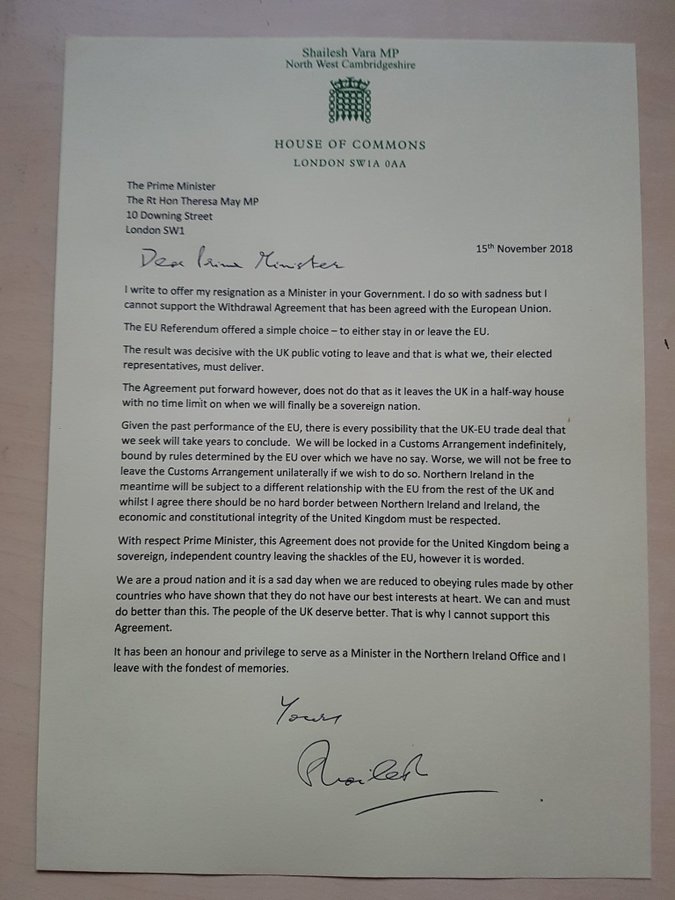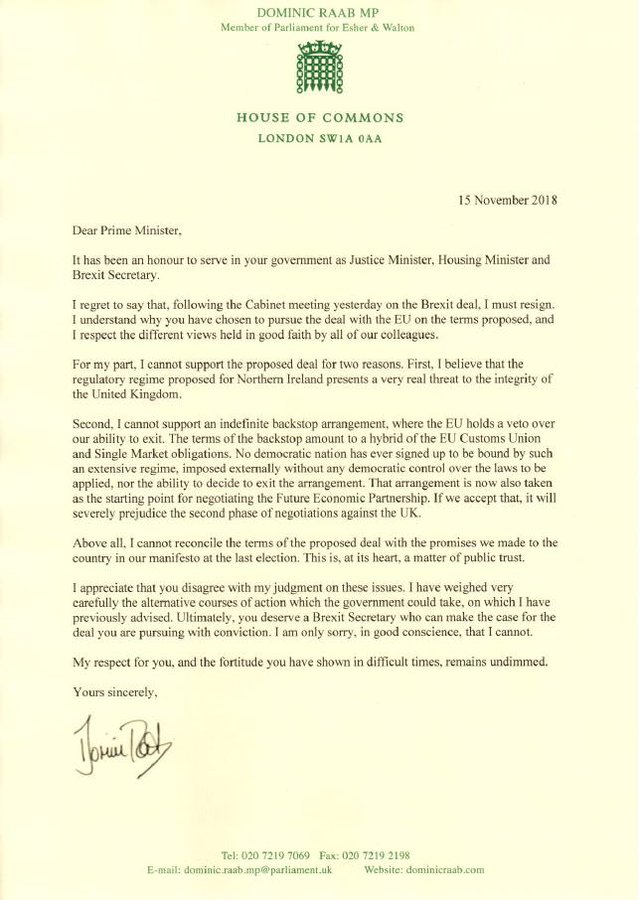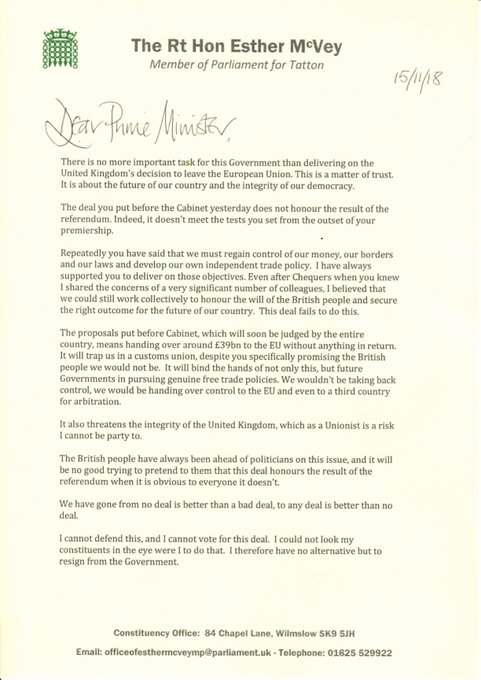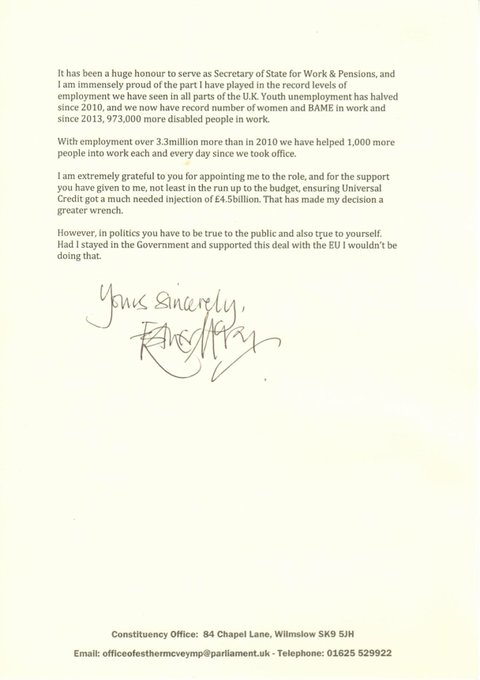LATEST
ANALYSIS NEWS4 resignations and counting: May’s government ‘falling
apart before our eyes’ over Brexit deal
The
beginning of the end for Theresa May’s government.
15
November, 2018
Via RT…
Four
high profile resignations have followed on the heels of Theresa May’s
announcement that her cabinet has settled on a Brexit deal, with Labour
claiming that the Conservative government is at risk of completely
dissolving.
Shailesh
Vara, the Minister of State at the Northern Ireland Office was the
first top official to resign after the prime minister announced that her
cabinet had reached a draft EU withdrawal agreement.
An
hour after his announcement, Brexit Secretary Dominic Raab – the man
charged with negotiating and finalizing the deal – said he was stepping
down, stating that the Brexit deal in its current form suffers from deep
flaws. Esther McVey, Secretary of State for Work and Pensions,
submitted her letter of resignation shortly afterwards. More
resignations have followed.
Labour’s
shadow Cabinet Office minister, Jon Trickett, predicted that this is
the beginning of the end for May’s government.
The government is falling apart before our eyes as for a second time the Brexit secretary has refused to back the prime minister’s Brexit plan. This so-called deal has unraveled before our eyes
Shailesh
Vara: UK to be stuck in ‘a half-way house with no time limit’
Kicking
off Thursday’s string of resignations, Vara didn’t mince words
when describing his reservations about the cabinet-stamped Brexit
deal.
Theresa
May’s EU withdrawal agreement leaves the UK in a “halfway house
with no time limit on when we will finally become a sovereign
nation,” his letter of resignation states. Vara went on to warn
that the draft agreement leaves a number of critical issues
undecided, predicting that it “will take years to conclude” a
trade deal with the bloc.
“We
will be locked in a customs arrangement indefinitely, bound by rules
determined by the EU over which we have no say,” he added.
Dominic
Raab: Deal can’t be ‘reconciled’ with promises made to public
Announcing
his resignation on Thursday morning, Brexit Secretary Dominic Raab
tweeted: “I cannot in good conscience support the terms proposed
for our deal with the EU.”
Raab
claimed that the deal in its current form gives the EU veto power
over the UK’s ability to annul the deal.
No democratic nation has ever signed up to be bound by such an extensive regime.
Former
Conservative Party leader Iain Duncan Smith said that Raab’s
resignation as Brexit secretary is “devastating” for May.
“It
sounds like he has been ignored,” he told the BBC.
Raab’s
departure will undoubtedly encourage other Brexit supporters to
question the deal, political commentators have observed.
Esther
McVey: Deal ‘does not honor’ Brexit referendum
Work
and Pensions Secretary Esther McVey didn’t hold back when issuing
her own letter of resignation. According to McVey, the deal “does
not honour” the result of the Brexit referendum, in which a
majority of Brits voted to leave the European Union.
Suella
Braverman: ‘Unable to sincerely support’ deal
Suella
Braverman, a junior minister in Britain’s Brexit ministry, issued
her resignation on Thursday, saying that she couldn’t stomach the
deal.
“I
now find myself unable to sincerely support the deal agreed yesterday
by cabinet,” she said in a letter posted on Twitter.
Suella Braverman, MP Parliamentary Under Secretary of State for the Department for Exiting the EU © Global Look Press / Joel Goodman
Braverman
said that the deal is not what the British people voted for, and
threatened to tear the country apart.
“It prevents an unequivocal exit from a customs union with the EU,” she said.
BREXIT
chaos, as May’s cabinet crumbles (Video)
If
Theresa May’s ill-fated Brexit Withdrawal Agreement is eventually
rejected this could trigger a vote of no confidence, snap elections
or even a new referendum…
Here
are six possible scenarios facing Theresa May and the UK (via The
Guardian)…
1
Parliament blocks Theresa May’s draft withdrawal agreement and
political declarations
May
faces an enormous task to win parliamentary approval, given that
Labour, the SNP, the DUP and 51 Tories have said they will not vote
for it.
If
the remaining 27 EU member states sign off the draft agreement on 25
November, the government will have to win over MPs at a crucial vote
in early December.
If
May loses the vote, she has 21 days to put forward a new plan. If she
wins, she is safe for now.
2
May withdraws the current draft agreement
The
prime minister could decide that she will not get the draft agreement
through parliament and could seek to renegotiate with the EU.
This
would anger Tory backbenchers and Brussels and would be seen as a
humiliation for her government. It might spark a leadership contest
too.
3
Extend article 50
May
could ask the European council to extend article 50, giving her more
time to come up with a deal that could be passed by parliament – at
present, the UK will leave on 29 March 2019.
Such
a request would not necessarily be granted. Some EU governments are
under pressure from populist parties to get the UK out of the EU as
soon as possible.
4
Conservative MPs trigger a vote of no confidence in the prime
minister
If
Conservative MPs believe May is no longer fit for office, they could
trigger a no-confidence vote.
Members
of the European Research Group claim that Graham Brady, the chair of
the powerful 1922 Committee, will receive the necessary 48 letters
this week.
A
vote could be held as soon as early next week. All Tory MPs would be
asked to vote for or against their leader. If May wins, she cannot be
challenged for at least 12 months. If she loses, there would be a
leadership contest to decide who will become prime minister.
5
General election – three possible routes
If
May fails to get support for the current deal, she could call a snap
general election.
She
would table a parliamentary vote for a general election that would
have to be passed by two thirds of MPs. She would then set an
election date, which could be by the end of January.
This
is an unlikely option. May’s political credibility was severely
damaged when she called a snap election in 2017, leading to the loss
of the Conservative party’s majority.
Alternatively,
a general election could be called if a simple majority of MPs vote
that they have no confidence in the government. Seven Tory MPs, or
all of the DUP MPs, would have to turn against the government for it
to lose the vote, triggering a two-week cooling-off period. May would
remain in office while MPs negotiate a new government.
Another
route to a general election would be for the government to repeal or
amend the Fixed-term Parliaments Act which creates a five-year period
between general elections. A new act would have to be passed through
both the Commons and the Lords – an unlikely scenario.
6
Second referendum
May
could decide it is impossible to find a possible draft deal that will
be approved by parliament and go for a people’s vote.
The
meaningful vote could be amended to allow MPs to vote on whether the
country holds a second referendum. It is unclear whether enough MPs
would back a second referendum and May has ruled it out















No comments:
Post a Comment
Note: only a member of this blog may post a comment.